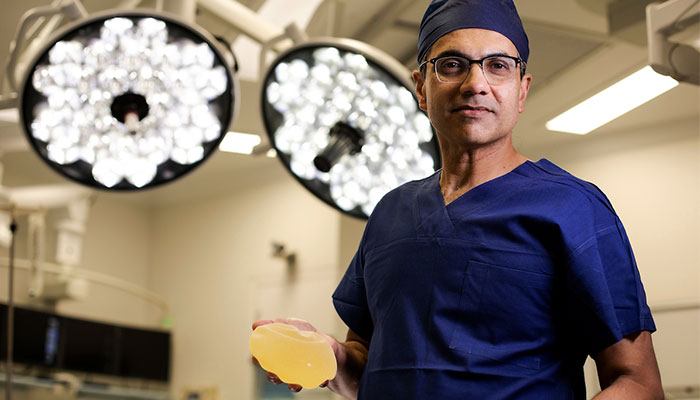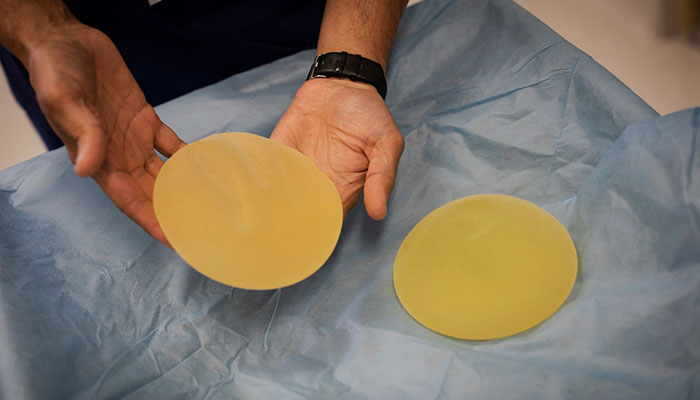New research from Macquarie University has reinforced the importance of choosing a qualified specialist surgeon for breast implant surgery.

Painful results: Preventable negative outcomes of breast implant surgery were more commn among women who have operations in the hands of uncertified doctors, Prof Deva’s new research found.
About 20,000 women have breast implants in Australia every year, with around three-quarters of them having implants for cosmetic enlargement. While numbers dropped at the start of the pandemic, they are picking up again now.
Plastic and Reconstructive Surgery Specialist, Professor Anand Deva, is the director of MQ Health’s Breast Implant Check Clinic, the first clinic of its kind in the world, which opened in 2018 and provides checks for women who are concerned about their implants.
He presented the yet-to-be-published research findings at The Australian Society of Plastic Surgeons Congress held at the Gold Coast Convention Centre on June 17.
Breast implants have been associated with a range of problems, including rupture, leak, hardening, and even a rare form of lymphoma, he said.
The clinic collected data from 603 women who attended for checks between 2018 and 2021, recording information such as patient age, the reason for surgery, where and when the procedure was conducted, the type of implants used, any complications experienced, and whether or not the doctor performing the surgery was a qualified specialist surgeon.
Certified v non-certified doctors
Just over 99 per cent of the 603 patients in the study reported at least one complication from their surgery, including rupture, capsular contracture (shrinkage and hardening of the implant), a ‘double bubble’ (where the implant has slipped down under the breast tissue), a ‘waterfall’ deformity (where the breast tissue slumps over the implant), and in some cases, severe and constant pain.
Of the 492 women who underwent cosmetic enlargement, 215 had their procedure performed by a certified and suitably qualified specialist surgeon, while 277 had their surgery with doctors who did not have this certification.
“Some complications, like rupture, may be associated with ageing implants, but a ‘double bubble’ is primarily due to poor technique with the implant being placed in the wrong position,” Deva says.
“Of the 68 women who presented with a ‘double bubble’ deformity after having surgery in Australia, 48 of them had non-certified doctors perform their procedures.
“In general, women who saw a non-certified doctor were twice as likely to have this negative outcome from their surgery.
“This goes right to the heart of the problem with non-certified practitioners: when people are not properly trained to do this procedure, patients are placed at greater risk of being harmed.”
Complications such as hardening and leaking commonly begin to appear after the 10-year mark due to age-related breakdown of the implants, but those that occur within five years of implantation are of particular concern as they may be associated with either device failure or doctor error.

Knowledge is power: 40 per cent of patients surveyed had poor knowledge of their procedure including what size or type of implants they had received, Prof Deva says.
Deva says these early complications are far more common among non‑certified practitioners.
“Double-bubble within five years was nearly six times as common in procedures by doctors without surgical qualifications as it was in those done by AHPRA-certified specialist plastic surgeons,” he says.
“Rupture was four times as common, rippling nearly four times as common, and contracture and poor positioning both three times as common.
“I would like to see any complications that occur within five years of implantation become nationally notifiable, because they will provide an early warning to hopefully identify problems and prevent patients from being harmed.”
A concerning lack of information
In some cases, Deva says the information provided to the patients was incomplete or even wrong.
Forty per cent of patients had poor knowledge of their procedure, including not knowing the name of the doctor who performed the surgery or the size or type of implants they had received. Knowing the type of implant is important, as breast-implant lymphoma is only associated with the textured implants that were common for some years.
If you don’t see one of two specialist surgery registrations, cancel your appointment.
“Many were not told of the long-term risks associated with implants,” he says.
“Some were even told they could now not have mammograms, which is not the case and can significantly impact on vital and necessary breast cancer screening.”
No such thing as a ‘cosmetic surgeon’
Deva says when looking for a doctor to carry out a breast enhancement procedure, it’s important to remember that there is no such qualification as ‘cosmetic surgeon’ in Australia.
“Doctors performing cosmetic breast implant surgery fall into one of two categories in this country,” he says.
“There are the certified practitioners, who hold a specialist qualification in surgery or plastic surgery as recognised by the Australian Health Practitioner Regulation Agency (AHPRA).
“Then there are the non-certified doctors, who often just have general registration but no specialist surgical training.”
Deva says former cut-price cosmetic surgery chain, The Cosmetic Institute (TCI) is a terrible example of what can happen when non-certified doctors carry out breast augmentation surgery.
In 2014, TCI began offering package deals to compete with the budget options offered overseas, running unlicensed clinics staffed by non-certified doctors.
More than 1000 women reported serious complications including punctured lungs, heart problems, seizures and deformities, and eight years later, a class action is still under way against TCI and its director.
Deva says it’s easy to check whether the doctor you’re planning to see for your cosmetic surgery is certified.
“If you search AHPRA’s registered practitioner list, you’ll see the type of registration they hold. It should be Specialist, not General, and the type of specialty should be Surgery, Plastic Surgery or both.
“If you don’t see at least one of those two specialist surgery registrations, cancel your appointment.”
Professor Anand Deva is a Specialist Cosmetic and Reconstructive Surgeon in Macquarie University’s Medical School.
If you have concerns about your breast implants, book a check at https://www.mqhealth.org.au/services/find-a-service/breast-implant-clinic







